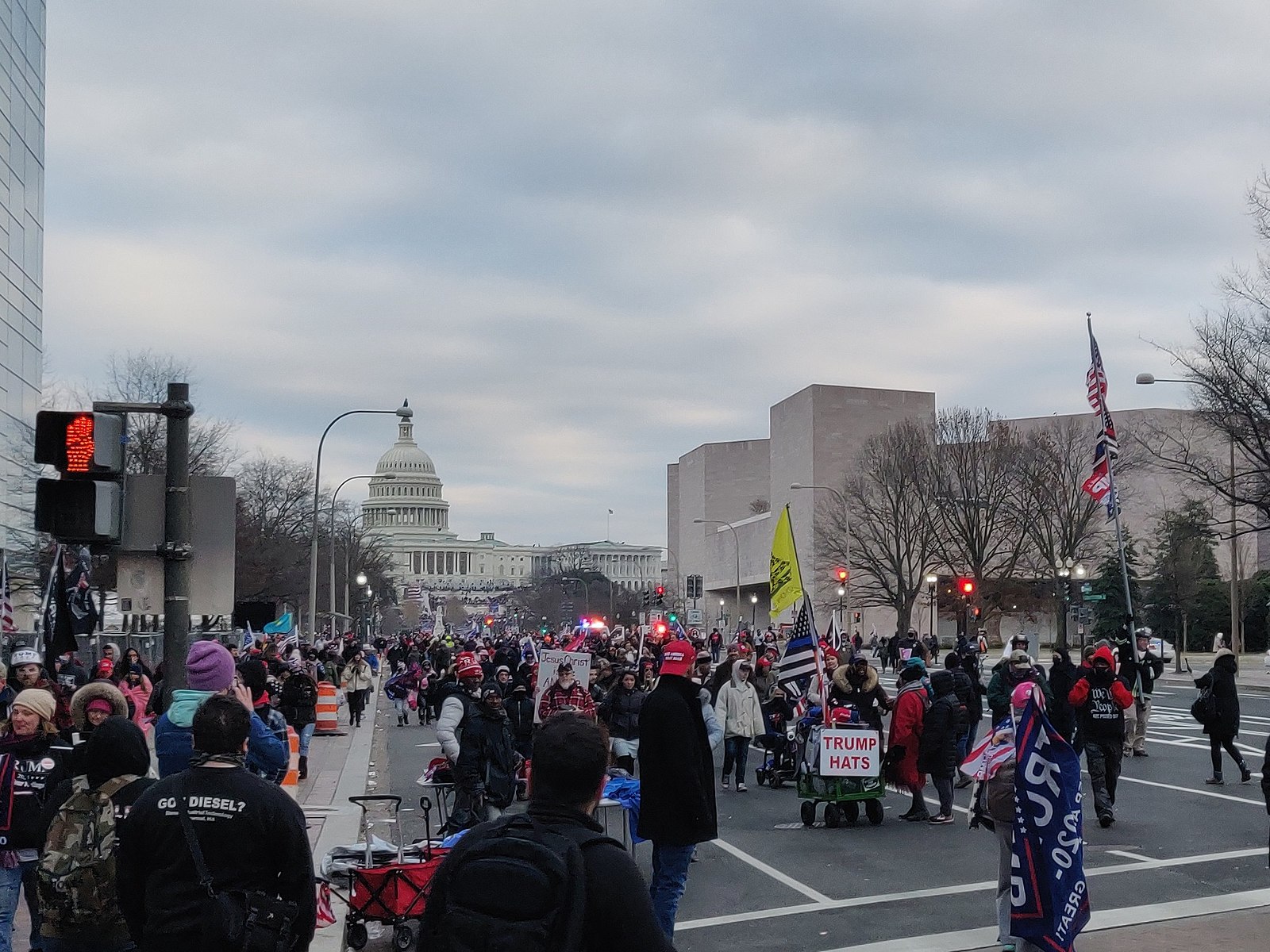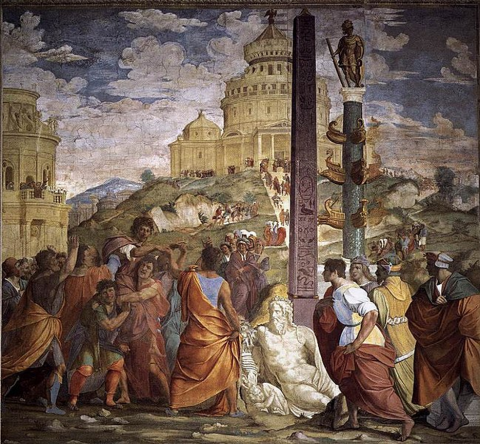Joel Christensen
January 6, 2022
At 2:00 pm on January 6th, 2021, a mob made its way up the steps of the U.S. Capitol following a morning of brinkmanship, speeches, and speculation. I sat in my office at home, logged into a Zoom session, watching Twitter and a streaming news channel on one screen, all while pretending to be engaged with the beginning of an SCS Panel, “The Powers and Perils of Solitude in Greek Literature.”
At 2:20 or so, I was slated to begin a talk entitled “Being Human, Being Alone” as the Capitol was evacuated and our legislators were put under protection. At 2:24 pm, President Trump tweeted, “Mike Pence didn't have the courage to do what should have been done to protect our Country and our Constitution, giving States a chance to certify a corrected set of facts, not the fraudulent or inaccurate ones which they were asked to previously certify. USA demands the truth!”
I started my talk with some incoherence, stating that it was hard to focus in the middle of an insurrection. There were almost 70 people in the Zoom room for a series of talks about epic and tragedy as something unprecedented transpired. I gave my talk in that space too many of us know well now: partly there, watching myself go through the motions of my career, only somewhat invested, wondering if this was the day our world would collapse for real.
A year later, pundits and professionals debate whether there was an insurrection at all, whether it was a Beer Hall Putsch practice run, whether our republic is broken, and what happens next. I’ve spent the same time trying to hold together the pieces of a pretty good life, inhabiting that same space of denial by pretending our politics will even out and that COVID-19 is an aberration rather than the beginning of a new normal.
.png)
Figure 1: A screencap of the opening slide of Christensen's PowerPoint.
When I think of that day and that talk, I have a surprisingly sharp image in my mind, approaching the clarity of a flashbulb memory. I can feel my heart rate change as I think of it. But the peculiar thing is, although I see my two monitor screens, with Twitter’s doom scrolling across them, I also see me sitting there, as if I were watching myself watch the world move by.
How would we remember the failed insurrection if it were in any other year, with any other president? My memory of that SCS panel and the live coverage of the attack on the Capitol now seems like a metonym to me: we watched the pandemic unfold, the #blacklivesmatters protests, and one of the most desperate elections of our lifetimes from our couches and office chairs; the primetime drama of our days scrolled across the smallest of screens. Even as I started my talk, I wanted to stop — I wanted to ask everyone in the room how much this matters compared to everything else going on. And now, a year later, it is just another moment in a sequence of going to work and playacting my life, doing nothing to face the forces slowly hedging it in.

Figure 2: Protest in support of President Trump at the capital
The problem with treating January 6th as a metonym is that it runs the risk of reducing so much to a single moment. It elides into one moment the stress and consequences of years. Even before January 6th, I found myself spending 2020 thinking about how we experience time and how the tension between stories of the past and our actual experiences of events can lead us to uncertainty. In teaching, I use a spatial metaphor to get students to think about this. Our memories of a journey are conditioned by the speed we take and the distance we cover. Consider the radically different impressions left from walking or running through a landscape and then driving through it at five or six times the speed. We notice different things; we absorb and remember distinct landscapes that are somehow the same.
In a way, the events of January 6th almost immediately made me think of Cicero and the Catilinarian Conspiracy. Perhaps Cicero isn’t the obvious place for a Hellenist — much less a Homerist — to go for solace. But 2020 found me combing through his letters. The speeches many of us read at a young age were edited and published a few years after the events, possibly as post facto justification for the then-Consul’s actions to suppress a conspiracy.
In my few decades as a Classicist, I’ve read and heard arguments about the true severity of Catiline’s actions and the legality of Cicero’s response. What our casual summaries often leave out, however, is that the Roman Republic was in trouble and had been in trouble for some time. The conspiracy was put down in 63 BCE. Three years later, the First Triumvirate “saved” the Republic. Over the next decade, Cicero was exiled and recalled. Twenty years after the conspiracy, Cicero was proscribed and was murdered.
These two Roman decades have weighed on me over the past 12 months. Over 20 years ago in our time, corrupt ballot counting in one state and a questionable Supreme Court ruling put the U.S. presidency in the hands of the weakest scion of a political dynasty. That was followed by two international wars, a collapsed economy, and a maddening political cycle. Even as our internal politics have grown more divisive, the projection of American military power into the world has barely changed. The intervening years have seen the gradual gerrymandering of districts, attacks on voting rights, extralegal and dangerous appointments to our Supreme Court, and the clear revelation that too many of our fellow citizens are comfortable — even in favor of — white supremacy and totalitarianism.
When Cicero retired to Antium in 59, he wrote to T. Pomponius Atticus, asking for gossip and news about Rome, even as he declared that he was dedicating himself to philosophy (Letters to Atticus 2.5). He remained engaged in politics in that decade, but following the Civil War between Caesar and Pompey, he withdrew from politics and wrote most of his academic work: Brutus, Academica, De Senectute, De Officiis, and more were written in the last four years of his life. Cicero was like one of those scholars we’ve all heard about on Twitter, who wrote three books during the COVID-19 pandemic and trained for an IronMan Triathlon at the same time.
And, yet, his letters do not sing of scholarly victories. Some of this self-reflection appears in his earlier years: from exile he writes to his wife Terentia, lamenting that he listened to bad advice but conceding that their troubles were his fault (sed omnia sunt mea culpa commissa, Epistulae ad Familiares 14.1). When he looks back a few years later in 54, he writes to Atticus that the Republic is gone, and he takes some pleasure in remembering how the state was governed well and that he has turned to his books and research for solace (quaeque vita maxime est ad naturam, ad eam me refero, ad litteras et studia nostra, Letters to Atticus 4.18).
.png)
Figure 3: “The Triumph of Cicero,” by Franciabigio
As someone who kept writing for The Conversation and working with Reading Greek Tragedy Online during 2020 and into 2021, I found a kindred spirit in Cicero when I read this. Indeed, Cicero even seems to make light of turning to research for consolation when he tells Varro in 47/46 that he reunited with his friends — his books! — upon returning to Rome, and that this would make it easier for him to manage in the future (Epistulae ad Familiares 9.1).
But the fragility of his optimism comes through later on. In 45, he acknowledges that the Republic is on the edge of ruin (6.2). In the next year, he sees a new war and sees his life as essentially over (sed mihi quidem βεβíωται, Letters to Atticus 14.21) and by the next year, he tells Brutus that there will be no real government if they lose and uncertainty even if they win (Letters to Brutus 1.15).
As I sat there on January 6th, presenting a talk I had written in a haze weeks before, I kept watching the news unfold and wondering what the point was of going through these scholarly motions. I spent most of the pandemic retreating like Cicero into my books, into that world of ideas. But the last decade has insistently been pushing on academia, especially Classical Studies, demanding that we understand the impact our work has on the world (or not) and asking us to understand the privilege that puts us in a position to do it. (And the systemic prejudices that keep others from doing the same.)
Cicero returned to the world to rail against Antony and work for the desperate chance that the worst outcome of decades of conflict might be avoided. Our discipline inherits and perpetuates Eurocentric and supremacist prejudices and structures; our nation is struggling not to fall into a new totalitarianism; and this most current plague is but the vanguard of climate change and further challenges to come. How much longer can we endure?
I have worn the patience of some of my colleagues by saying that I don’t want to have to tell my grandchildren that, when the world was burning, I wrote big books about minor things. Perhaps on the fourth anniversary of January 6th, 2020, I will feel less pessimistic. But right now, I don’t know if retreating to my books will ever again bring the solace it once did.
Thanks to T. H. M. Gellar-Goad, Nandini Pandey, and Sarah E. Bond for edits and advice and Hannah Čulík-Baird for timely answers about Cicero.
Authors


